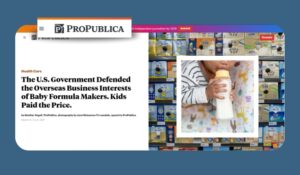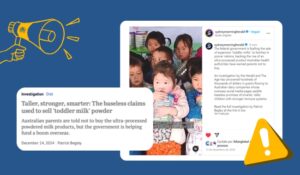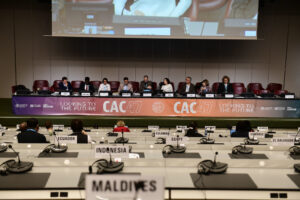With new rules, Thailand joins three dozen countries that have...
Read MoreCODEX
IBFAN in the Codex Alimentarius
What is Codex Alimentarius and why does IBFAN attend?

Codex is a joint United Nations body created in 1963 by the World Health Organisation (WHO) and the FAO to develop food standards, guidelines and codes of practice under the Joint FAO/WHO Food Standards Programme. IBFAN has been attending Codex meetings since 1995 when the World Trade Organisation (WTO) was established and was mandated to refer to Codex Standards in trade disputes. Overall, Codex has had a damaging influence on the protection of breastfeeding and child health. The lack of transparency and poor conflict of interest safeguards, coupled with the dominance of food corporations and powerful exporting nations, has led to Codex adopting weak standards for many harmful foods and commodities. These standards have been regularly used in attempts to stop governments bringing in strong marketing controls. with interventions made at the WTO concerning commercial milk formula marketing, labelling or safety testing regulations of another member state, wrongly treating Codex standards as a ‘regulatory ceiling’ for trade purposes. In fact, governments have the sovereign right to adopt any legislation they consider necessary to protect child health as long as it does not violate international trade principles,
Largely because of IBFAN’s consistent advocacy at Codex, the standards on foods for infants and young children adopted after 1995, all refer in some way to the International Code, the Global Strategy and/or the subsequent WHA Resolutions on infant and young child feeding and the Codex Code of Ethics for International Trade continues to require Member States to “…make sure that the international code of marketing of breast milk substitutes and relevant resolutions of the World Health Assembly (WHA) setting forth principles for the protection and promotion of breastfeeding be observed.”
The 44th Codex Nutrition Committee in October 2024 tested a new draft prioritising system where Codex members and observers were asked to assess and score the impact new standards might have, not only on trade, but on global public health and food safety, something we have .been calling for that could help ensure that standards are in line with WHO recommendations. This did seem to be prompt governments to recognise the role Codex has had, and still has, in flooding the world with plastic packaged UPF and be more alert to the risks of approving new global standards and guidelines.
IBFAN Comments on Codex Strategic Plan 2026-31
44th Session of the Committee on Nutrition and Foods for Special Dietary Uses
Dresden, Germany on 2 – 6 October 2024
Codex Press Releases and comments over the years
News about the Codex Alimentarius
CODEX OPENS THE DOOR TO EXPLOITATION OF EMERGENCIES – AUSTRALIAN EXAMPLE
IBFAN warned that without extra safeguards, the new Codex Guidelines...
Read MorePLASTIC TREATY FAILS: CAN CODEX CHANGE AND PRIORITISE HUMAN AND PLANETARY HEALTH?
The Global Plastics treaty failed to reach a consensus in...
Read MoreLIFE LONG RISKS OF SUGARS IN BABY FOODS AND DOUBLE STANDARDS PROMPT CALLS FOR TRANSPARENCY AND REGULATION
Researchers from the University of Southern California have found that cutting...
Read More




